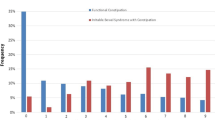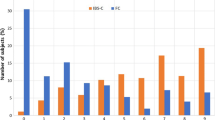Abstract
Introduction
Diagnostic criteria for irritable bowel syndrome (IBS) have not been validated by prospective symptom diary. We investigated the bowel patterns in community subjects with and without non-organic abdominal pain, and compared the symptoms with subjects fulfilling the Rome II criteria (IBS).
Methods
From the Swedish population register, a random sample completed an abdominal symptom questionnaire. Responders were subsequently invited for a clinical evaluation and offered a colonoscopy regardless of whether they had abdominal symptoms or not. A total of 268 subjects underwent colonoscopy, clinical evaluation by gastroenterologist, laboratory investigations, and completed the Rome questionnaire and prospective gastrointestinal (GI) symptom diaries for 1 week. Twenty-three subjects of 268 were excluded due to organic GI disease.
Results
Subjects recorded 2,194 bowel movements and 370 abdominal pain episodes on 1,504 days. Subjects with pain in the diary (n = 81) had higher stool frequency (P = 0.01), more urgency (P = 0.0002), feelings of incomplete evacuation (P = 0.0002), nausea (P = 0.0009), and abdominal bloating (P = 0.0005) than subjects without pain (n = 151). Twenty-eight subjects (12%) fulfilled the Rome II criteria for IBS. Together, they had 96 pain episodes but only 4% were improved by defecation; 29% of the pain episodes started or worsened after a meal. Subjects with IBS and other subjects with non-organic abdominal pain (n = 64) exhibited no differences in terms of the proportions of pain episodes improved by defecation, bloating, stool frequency, consistency, or defecatory symptoms.
Conclusions
Current criteria for IBS that rely on recall of the relationship between abdominal pain and bowel disturbance may overcall this association when measured prospectively.


Similar content being viewed by others
References
Longstreth GF, Thompson WG, Chey WD, Houghton LA, Mearin F, Spiller RC. Functional bowel disorders. Gastroenterology. 2006;130(5):1480–1491.
Rome II: a multinational consensus document on functional gastrointestinal disorders. Gut. 1999;45(Suppl 2).
Spiller R, Aziz Q, Creed F, Emmanuel A, Houghton L, Hungin P, et al. Guidelines on the irritable bowel syndrome: mechanisms and practical management. Gut. 2007;56(12):1770–1798.
Drossman DA, Sandler RS, McKee DC, Lovitz AJ. Bowel patterns among subjects not seeking health care. Use of a questionnaire to identify a population with bowel dysfunction. Gastroenterology. 1982;83(3):529–534.
Mearin F, Badía X, Balboa A, Baró E, Caldwell E, Cucala M, et al. Irritable bowel syndrome prevalence varies enormously depending on the employed diagnostic criteria: comparison of Rome II versus previous criteria in a general population. Scand J Gastroenterol. 2001;36(11):1155–1161.
Jones R, Lydeard S. Irritable bowel syndrome in the general population. BMJ. 1992;304(6819):87–90.
Bommelaer G, Poynard T, Le Pen C, Gaudin AF, Maurel F, Priol G, et al. Prevalence of irritable bowel syndrome (IBS) and variability of diagnostic criteria. Gastroenterol Clin Biol. 2004;28(6–7 Pt 1):554–561.
Talley NJ, Howell S, Poulton R. The irritable bowel syndrome and psychiatric disorders in the community: is there a link? Am J Gastroenterol. 2001;96(4):1072–1079.
Manning AP, Thompson WG, Heaton KW, Morris AF. Towards positive diagnosis of the irritable bowel. Br Med J. 1978;2(6138):653–654.
Hooper LV, Wong MH, Thelin A, Hansson L, Falk PG, Gordon JI. Molecular analysis of commensal host-microbial relationships in the intestine. Science. 2001;291(5505):881–884.
Adlerberth I, Wold AE. Establishment of the gut microbiota in Western infants. Acta Paediatr. 2009;98:229–238.
Agréus L, Svärdsudd K, Nyrén O, Tibblin G. Reproducibility and validity of a postal questionnaire. The abdominal symptom study. Scand J Prim Health Care. 1993;11(4):252–262.
Ragnarsson G, Bodemar G. Division of the irritable bowel syndrome into subgroups on the basis of daily recorded symptoms in two outpatients samples. Scand J Gastroenterol. 1999;34(10):993–1000.
Lewis SJ, Heaton KW. Stool form scale as a useful guide to intestinal transit time. Scand J Gastroenterol. 1997;32(9):920–924.
Drossman DA, Corazziari E, Talley NJ, et al. ROME II: the functional gastrointestinal disorders. Diagnosis, pathophysiology and treatment: a multinational consensus. 2nd ed. McLean, VA, USA: Degnon Associates; 2000.
Drossman DA. The functional gastrointestinal disorders and the Rome II process. Gut. 1999;45(Suppl 2):II1–II5.
Ragnarsson G, Bodemar G. Pain is temporally related to eating but not to defaecation in the irritable bowel syndrome (IBS). Patients’ description of diarrhea, constipation and symptom variation during a prospective 6-week study. Eur J Gastroenterol Hepatol. 1998;10(5):415–421.
Gomborone JE, Dewsnap PA, Libby GW, Farthing MJG. Selective affective biasing in recognition memory in the irritable bowel syndrome. Gut. 1993;34:1230–1233.
Manning AP, Wyman JB, Heaton KW. How trustworthy are bowel histories? Comparison of recalled and recorded information. Br Med J. 1976;2:213–214.
Garrigues V, Mearin F, Badía X, Balboa A, Benavent J, Caballero A, et al. Change over time of bowel habit in irritable bowel syndrome: a prospective, observational, 1-year follow-up study (RITMO study). Aliment Pharmacol Ther. 2007;25(3):323–332.
Thompson WG. Gender differences in irritable bowel symptoms. Eur J Gastroenterol Hepatol. 1997;9(3):299–302.
Gwee KA, Bak YT, Ghoshal UC, Gonlachanvit S, Lee OY, Fock KM, et al. Asian consensus on irritable bowel syndrome. J Gastroenterol Hepatol. 2010;25(7):1189–1205.
Wiesner M, Naylor SJ, Copping A, Furlong A, Lynch AG, Parkes M, et al. Symptom classification in irritable bowel syndrome as a guide to treatment. Scand J Gastroenterol. 2009;44(7):796–803.
Acknowledgment
We acknowledge the recently deceased Professor Göran Bodemar for his enthusiastic help with the design of this study.
Author information
Authors and Affiliations
Corresponding author
Rights and permissions
About this article
Cite this article
Walter, S.A., Kjellström, L., Talley, N.J. et al. Prospective Diary Evaluation of Unexplained Abdominal Pain and Bowel Dysfunction: A Population-Based Colonoscopy Study. Dig Dis Sci 56, 1444–1451 (2011). https://doi.org/10.1007/s10620-010-1468-y
Received:
Accepted:
Published:
Issue Date:
DOI: https://doi.org/10.1007/s10620-010-1468-y




